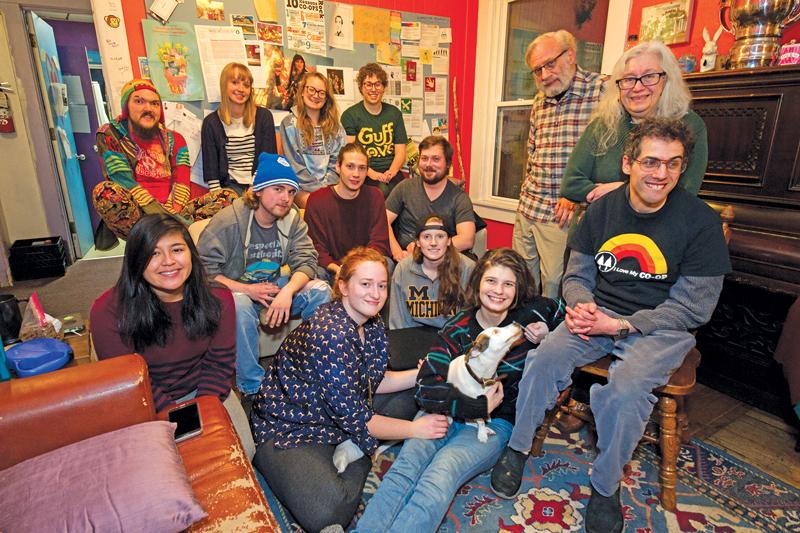I was a U-M student in the late 1960s, when the military draft loomed, women joining the workplace discovered glass ceilings, and the civil rights struggle was in full gear. We marched and sat-in, somehow also managing to study as we worked together to create a better society.
I lived at Osterweil Co-op on East Jefferson, loving it, and not just because co-ops cost less than other campus housing. In our self-governing house, we engaged in a messy democratic process, sharing chores and decisions, making the house run while trying to change how the country ran. Sure, we alone didn’t end the Vietnam War, but it sure felt like it.
Before my time, in 1956, the writer Marge Piercy lived in Osterweil. “We were two or three to a room, all women,” she emails. “We had male boarders who ate with us. It was a close-knit house. A lot of folk singing and cheap food.”
That’s just the way I remember Osterweil, plus a lot of arguing about how the change we all wanted should be achieved. If passersby didn’t hear raised voices through an open window, they might have heard us gathered around the piano, singing with determination that We Shall Overcome.
Not wanting to leave when my undergrad days were over, I picked up an MA before moving to New York with my husband, Greg. A former Osterweil boarder, he had to forgo graduate work in philosophy and enlist in the Teacher Corps to avoid being drafted.
We enjoyed New York until the late ’70s, when our first son, Randy, was born and the urban strife got to us. I found myself recurrently singing “I wanna go back to Michigan, to dear Ann Arbor town …”
Greg quit his job, even though he had no employment prospects here. I told my editors at city magazines that I could no longer cover New York events. We packed a U-Haul. We bought a house on South Forest. And here we were in a lovely town with a vibrant cultural life, with good schools and safe parks. Why didn’t it feel like Ann Arbor?
No longer mobilized by an immediate threat, Ann Arborites seemed settled in the routines of everyday life–work, kids, recreation. We made friends, joined a babysitting co-op and a skills exchange group, but nothing fully satisfied my longing for connection. Was Ann Arbor in Michigan or did it exist in a time and not a place? Was Michigan a state of mind?
—
I began to feel I’d come home, however vicariously, when our second son, Brian, moved into a co-op. Brian was born with cerebral palsy, and after graduating from Pioneer High in 2000, he wanted to live independently but needed more support than most. Nonstudents can be voted into what is primarily student housing, and he moved into a co-op down the block from us on Forest. Since 2006, he has been living or boarding at Black Elk Co-op, a vegetarian house on Baldwin.
Elkers come and go, but since there’s always carryover from previous years in the twenty-two-member house, there’s some consistency. Some of the stickers inside the front door date to the George W. Bush era. One of my favorites: “A woman’s place is in the House–and the Senate.”
Like many people with disabilities, Brian had difficulties integrating into the social life of Ann Arbor until he found an inclusive community. He’s taken trips to Boston, Austin, and the U.P. with housemates. “We’ve gone to movies and apple picking and laser tag and hot tub oasis,” Brian says. “There are board game nights and puzzle nights.”
“Everyone is a little weird,” says Elk member Aliza Gersing, a philosophy major who appreciates the nonjudgmental environment. “For people who have been judged and had trouble finding their people, there’s a sense of family.”
Brian says he’s shared the house with “people from Japan, China, India, Malaysia, Saudi Arabia, Austria, England, Russia. People have different cultures and different religions and different majors. They are gay and straight and gender-neutral, Caucasian and African American.” It’s like having all of Ann Arbor in one house, working and enjoying life together.
—
I recently stopped by Osterweil. It looks the way I remember it–an upright piano in the living room, posters on the walls, one long dining table for all–except the basement has been renovated beautifully and the members aren’t obsessed with politics. House president Ellie Epskamp-Hunt says Osterweil has its own social events that create community. Yiwen Lin, who was cooking dinner for everyone, lived in an apartment last semester. “It was more isolated. I feel a sense of connection here,” she says.
Over the years, I also have felt more connected to Ann Arbor–writing an occasional story for the Observer helps–but never so much as since November 2016. I haven’t been going to D.C. to march as I once did. Now we march downtown, alongside other Ann Arborites. As we cry out together against varied injustices, I feel I’m back in Ann Arbor, my town.


